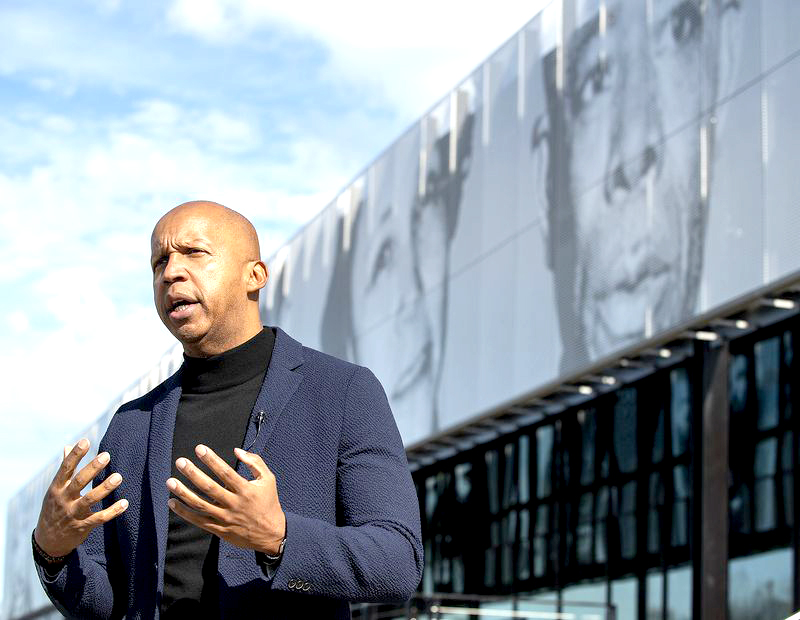By Mike Cason
Bryan Stevenson, founder of the Equal Justice Initiative and author of “Just Mercy,” the story of an innocent man on Alabama’s death row, said a new rule allowing more time for executions will not solve the state’s problems with capital punishment.
Stevenson, in an interview with AL.com, said Alabama has not fully explained why it had to stop two lethal injections in progress last year or why a third took more than three hours to complete. In all three cases, the Alabama Department of Corrections said it had difficulty starting the intravenous lines.
“If state personnel cannot access someone’s vein after poking and prodding for two or three hours, they should stop,” Stevenson said. “And they should stop — not because the clock is running out — but because they do not have the capacity to, in a humane and constitutional manner, carry out that execution. And so I don’t think we’ve solved any of the critical problems that need to be solved by this adjustment.”
After the second failed lethal injection in November, Gov. Kay Ivey called for a moratorium on executions for a “top to bottom” internal review. In February, Ivey announced the review was finished. A new rule adopted by the Alabama Supreme Court gives the state more time to put inmates to death. Instead of limited to a single day, the governor picks a time frame with a 30-day window set by the court.
In May, the governor announced Alabama’s next execution, of James Barber, would happen within a 30-hour period that ends at 6 a.m. on July 21. That will end the longtime practice of scheduling 6 p.m. executions that have to be finished by midnight.
“I do not believe the problem with any of the executions that we have seen had anything to do at all with the length of time the Department of Corrections had to carry out these executions,” Stevenson said. “Secondly, there’s a reason why we provide clarity and certainty around execution dates. Because a well recognized form of torture is to say, ‘Oh, we’re going to execute you, but we’re not going to tell you when. It could be in the next hour. It could be in five hours.’ And I don’t think what we’re doing is moving in the direction of respect for basic human rights. I think it’s the opposite.”
The moratorium and new rules came after the prolonged execution in July 2022 of Joe Nathan James Jr., followed by the failed attempts to execute Alan Eugene Miller in September and Kenneth Eugene Smith in November. The execution of James started three hours late because of difficulty starting the IV lines. The ADOC called off the executions of Miller and Smith after 11 p.m. because of concerns they would not be finished when the execution warrants expired at midnight.
Ivey blamed the failures on appeals filed by death row inmates. In Miller’s case, the U.S. Supreme Court cleared the way for the execution at 9 p.m., three hours after the scheduled start. For Smith, the Supreme Court lifted the stay on his execution at 10:23 p.m.
“Far too many Alabama families have waited for far too long — often for decades — to obtain justice for the loss of a loved one and to obtain closure for themselves,” Ivey wrote in a letter to Attorney General Steve Marshall in February, announcing the end of the execution review. “This brief pause in executions was necessary to make sure that we can successfully deliver that justice and that closure. Now it is time to resume our duty of carrying out lawful death sentences.”
Ivey wrote that she had assurances that the ADOC “is as prepared as possible to carry out death sentences going forward, consistent with the Constitution and even knowing that death-row inmates will continue doing everything within their power to evade justice.”
Stevenson said Alabama’s response to the lethal injection failures is part of a larger problem — a lack of commitment to a humane and constitutional criminal justice system. Stevenson and the the Equal Justice Initiative have taken that position for years and have documented problems in Alabama’s prison system that sparked federal interventions. The Department of Justice alleged unconstitutional conditions in the state’s prisons for men in a lawsuit in 2020, a case that is ongoing.
“I don’t think there’s any question that there has to be a different orientation to how (executions) are carried out,” Stevenson said. “But I also think the underlying problem, to be honest, you have to care. It has to matter to you that you do things right. This is a global problem with our corrections system. We have one of the highest murder rates in the country. We have an unbelievably high assault rate. We don’t have enough staff and so the prisons are not well managed. They are in chaos. And it’s been that way for seven or eight years.
“And you can blame funding,” he added. “You can blame recruitment. You can blame this and blame that. But the truth is, if you don’t care enough, these problems will never get solved. And I just think we haven’t done enough to express a real commitment to being humane and just.”
Marshall’s office sent a statement in response to questions about Stevenson’s comments that Alabama’s problems with executions reflect a lack of commitment to a fair criminal justice system.
“The State of Alabama will continue to carry out the death penalty, as that is what justice demands,” Marshall said. “If you commit and are convicted of a capital offense here, then you will receive your just punishment. For that, we offer no apology.”
Stevenson said there is a glaring lack of information about why Alabama needs more time to carry out executions after doing it the same way for years..
“No one has really talked about the fact that there are dozens of people that have been executed in the state without the problems that we’ve seen over the last year,” Stevenson said. “And no one has answered, why now, why are we now having these problems?We’ve never needed a 30-hour window before. If you’re not prepared to ask hard questions about what are we doing wrong now, what’s happening, how are we failing, we’re not going to get the answers. I just don’t think the state has said enough about what the real problems are and how those problems are going to be addressed. So that makes me very fearful and very anxious about any effort to execute another person on Alabama’s death row.”
With every execution, public statements from the governor and the attorney general focus on the decades it takes to carry out a death sentence, justice for the victims and their families, and the brutality of the crimes. For example, James shot and killed his ex-girlfriend Faith Hall in 1994 after stalking and harassing her, according to court records. Miller killed three men in Shelby County in a shooting spree in 1999. And Smith was convicted in the stabbing and beating death of Elizabeth Dorlene Sennett in 1988, a murder-for-hire committed for $1,000.
Before James was executed, Faith Hall’s daughters asked Ivey to commute his sentence to life without parole.
“With any execution case, I look very closely at the history, the cold-hard facts and all other information or correspondence I may receive,” Ivey said after James was executed. “I also take deeply seriously the feelings and position of the victim’s family and loved ones. However, we must always fulfill our responsibility to the law, to public safety and to justice. Tonight, a fair and lawful sentence was carried out, and an unmistakable message was sent that Alabama stands with victims of domestic violence.”
Stevenson was asked why the public should care that an inmate who committed a brutal crime suffers because of a prolonged, delayed, or bungled lethal injection procedure.
“Because we have to be better than the people who have committed violent crimes,” Stevenson said. “We can’t become murderers and rapists just because someone has committed murder or rape. We don’t rape people who have been convicted of rape, because most of us recognize that that would be indecent, that we would lose something valuable, like our dignity and integrity and character and humanity, if we engaged in that. And we cannot replicate the worst behaviors of people in our society and still claim to be an evolved society, an evolved government.
“People have done horrific things. But if you simply tolerate their horror by engaging in horror, or respond to their horror with horror, you become more like them than the kind of just society I think most of us want to live in.”
Stevenson said the failed and delayed executions and the state’s response undermine trust in government.
“The measure of a government, of a society, you can’t measure them by how well they treat talented, gifted, privileged, wealthy people,” Stevenson said. “The character of a government has to be judged by how you treat poor people. Abused people. Marginalized people. Condemned people. Those are the people that actually reveal what kind of society we live in.”
Stevenson grew up in a poor, rural, Black community in Delaware. He came to Alabama after graduating from Harvard Law School and founded the Equal Justice Initiative in 1989. The nonprofit organization represents inmates who are impoverished, reports on violence in Alabama prisons, and opposes the death penalty and long sentences that have filled state prisons beyond capacity.
Stevenson’s book, “Just Mercy: A Story of Justice and Redemption,” published in 2014, tells the story of Walter McMillian, a Black man from Monroe County who sat on death row for six years, wrongly accused of the murder of an 18-year-old white woman. Stevenson and EJI helped win McMillian’s release in 1993. The movie based on the book, “Just Mercy,” was released in 2019 and featured Michael B. Jordan as Stevenson and Jamie Foxx as McMillian.
Stevenson and the EJI have launched several public projects in Montgomery. In 2018, the EJI opened the National Memorial to Peace and Justice, an outdoor monument to lynching victims, and The Legacy Museum: From Enslavement to Mass Incarceration. In 2021, the EJI reopened an expanded Legacy Museum in a new location.
More recently, EJI has started an anti-poverty program to help families who struggle to obtain healthy food, and a health clinic for people who have been released from jail or prison.
In May, former Govs. Don Siegelman and Robert Bentley co-wrote an op-ed column published by The Washington Post to express regret for executions during their times as governor. Siegelman and Bentley said the state should commute the sentences of 146 inmates on death row to life sentences, those sentenced to death by less than a unanimous decision by a jury and those sentenced to death by a judge who overrode a jury’s recommendation of life in prison.
The Alabama Legislature banned judicial overrides in 2017, but the change was not retroactive. Alabama law requires a unanimous jury verdict for a criminal conviction, but allows for sentencing a person convicted of a capital offense to death by a 10-2 jury vote.
Stevenson said the concerns expressed by the former governors are not unusual for those who have been involved in executions.
“What I found interesting about that is that it actually fit the pattern of a lot of people who were involved in this process,” Stevenson said. “It’s not just Governor Bentley and Governor Siegelman. It’s wardens who carried out executions for years. It’s correctional officers, some of whom have quit as a result of depression and trauma, as a result of being involved in these executions.
“I don’t think there’s a way to kill another human being that we don’t have to kill and not have it impact you, to not have it compromise you, to not have it injure you. And for me, it’s just one other reason why we should abolish this practice of killing people to show that killing is wrong. Because not only do we not advance anything that’s moral and just. We create a lot of pain and anguish and injury for a lot of other people, including the participants in that execution process.”











